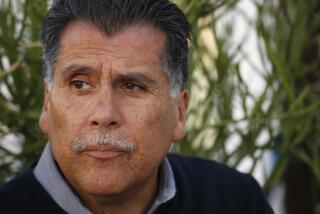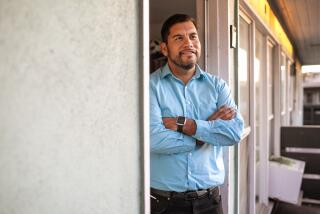As a sister city of Gaborone, Burbank was a logical stop.
- Share via
The chief of police of Burbank and the mayor of Gaborone, capital and largest city of Botswana, had lunch last week at the Lakeside Country Club to talk law enforcement.
The meeting was arranged by the State Department, which is taking 43-year-old Paul Mmlotsi Rantao on a monthlong friendship tour of this country.
Rantao is a rising figure in the Botswana National Front, a major party in one of Africa’s few flourishing multi-party democracies. Botswana gained independence peacefully in 1966 after 81 years as a British protectorate. Now it carries on delicately as an economically dependent neighbor of South Africa, whose racial policies it openly abhors.
Rantao, a shrewd politician with an eye for national office, has used his time in America to cultivate ideas and contacts. In Atlanta, he visited Mayor Andrew Young. In Los Angeles, he met Mayor Tom Bradley.
His spin through Burbank on Thursday had a different purpose--to tap local officials for insights into matters such as roads, fire and police.
As a sister city of Gaborone, Burbank was a logical stop.
Rantao and his State Department escort, Richard Berger, visited the city manager in the morning, a fire station in the afternoon and the city’s elected leaders at a reception that evening. I joined an impromptu lunch with library-services director Marcia Richards and Police Chief Glen Bell.
Bell suggested Lakeside, where he has an account. The country club is a peaceful hideaway of Spanish-mission arches and hanging floral baskets. High stone walls insulate it from the fast pace of the nearby studio district.
Seated next to each other, in a subdued dining hall, Bell and Rantao made quite a contrast.
Bell--stout shoulders, blue blazer, short silvery hair--was every bit a cop. He talked robustly and made jokes, often at his own expense.
Rantao--tall and slender--carried himself lithely in a black suit with wide lapels and vertical gold stripes. He spoke so softly, he was hard to hear.
He was interested in training, hoping to upgrade his force of municipal law-enforcement officers who are overshadowed by the better-equipped federal police.
Bell allowed that his department sometimes needs help from outside.
“We call the sheriff and say, ‘Send us a SWAT team,’ ” he said.
Rantao seemed not to comprehend.
Later, he asked, “Am I allowed to smoke?”
“If you will, I will,” Bell said, gratefully.
They lit up.
Bell asked me if I had any questions, then joked at my expense. What bothers him about journalists, he said, is all the questions they ask. Fresh on his mind was a grilling he received after deciding to change the color of Burbank’s police cars.
“That’s a bunch of crap, you know,” he said. “It’s just a very simple question and they tie me up for 45 minutes on it when I should be doing something else.”
Richards used the next pause to mention that Rantao had been a journalist--editor of the Botswana Daily News--before he became mayor.
I asked a few questions about Gaborone.
Rantao said it is a capital built from scratch, like Brasilia, and has grown from fewer than 20,000 inhabitants on independence day to 100,000 today, making it slightly larger than Burbank. People still stream in from rural Botswana, seeking work, and from South Africa, seeking asylum.
What that means for Gaborone, he said, is unemployment, housing pressure, traffic congestion and the threat of raids from the South African border only a few kilometers away.
About then, Richards mentioned that the Botswana contingent stayed in Burbank during the Los Angeles Olympics. She said a woman told her that the men of Botswana once wanted to legalize polygamy but that the women blocked the idea by threatening to legalize polyandry.
“That’s one thing I admire about Botswana,” she said. “They have some real feminist women.”
“Maybe you ought to move to Botswana,” Bell said.
Rantao returned to a topic he was comfortable with.
“South Africa has accused us of harboring terrorists,” he said. He denied it, but said his country hasn’t the resources to check everyone. “Our army is so small.”
He said South African troops have raided Gaborone, one time wounding his brother. They are posted so close to the capital, they can spy on it through binoculars.
“Let me ask you a dumb question,” the chief broke in. “Why didn’t they put it more in the middle of the country?”
Rantao shrugged. “We regret it now. What can be done?”
“I have no idea what your city is like, so I’m probably asking a lot of dumb questions,” Bell said. “Do you have a traffic-signal system?”
Partly, Rantao said, but there are also areas where even the houses lack electricity.
The chief kept trying.
“Is your system of law codified?”
“Oh, yes,” Rantao said, ever gracious.
He described some tricky points in Botswana law concerning tribal customs such as insults and wizardry.
“What to me could be an insult, to you is not,” he said. “If somebody says, ‘Your mother’s shoe,’ that is very serious.”
Such subtleties were lost on the colonial magistrates, Rantao said with a smile.
The chief could relate to that.
More to Read
Sign up for Essential California
The most important California stories and recommendations in your inbox every morning.
You may occasionally receive promotional content from the Los Angeles Times.














